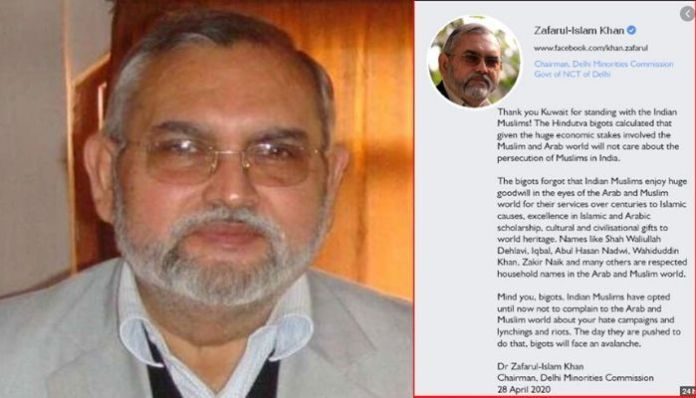Syed Ghiasuddin
Zafar-ul-Islam Khan, Chairman of Delhi Minority Commission became the centre of a controversy for his tweet dated 28th April 2020. The tweet thanked Kuwait for taking note of rising cases of violence against Muslim citizens of India. Khan had also targeted ‘Hindutva bigots’ whom he alleged were taking advantage of the silence of Indian Muslims assuming the Arab world will not speak against such atrocities given their economic interests vested in India.
As the tweet went viral, it generated considerable outrage, and Delhi Police’s special cell lodged a case under Sec 124A and Sec 153A. Khan had also made a Facebook post on the same date, speaking in defence of Tableeghi Jamaat attendees who have been quarantined. “Tablighi inmates and many others have completed 28 days in corona isolation, rather than a detention centre, which is twice the mandatory 14 days quarantine period for corona suspects as per the US and WHO guidelines,” his post read. He added, “Keeping people in isolation, who tested negative and spent twice the mandatory period in corona isolation centres, is tantamount to illegal detention.”
Ever since cases of Covid19 were discovered in Tableeghi Jamaat headquarters at Nizamuddin Markaz in New Delhi, it has worked as fodder to an all-out Islamophobic campaign, targeting the entire community as a spreader of the disease or ‘Corona Bombs’. Primetime media programmes, social media trends, and political bickering further added to this narrative that the Muslim community is responsible for spreading the virus in the country. Khan has been slapped with sedition charges for his social media posts, and a special cell of the Delhi Police visited his house for interrogation. This renews the debate on the misuse of sedition laws to silence dissent.
British regime Sedition and ‘otherization’
Unarguably, sedition is a legacy of the British. It was a potent weapon in the colonial era to muzzle the voices of dissent. Bal Gangadhar Tilak, Mahatma Gandhi, Maulana Azad and many other freedom fighters were charged under sedition to ‘otherize’ and ‘de-legitimize’ their struggle. British interpretation of sedition outlaws the freedom of speech.
As per the established legal fundamentals, ‘intention’ and ‘action’ complete the act of crime. Sedition, as defined under section 124(a) of IPC, apparently doesn’t necessarily require the ‘action’ to attract the sedition. This interpretation justified the repressive policies of the British against leaders of the Indian independence struggle. The interest of the British was paramount, and all laws were subjected to their interest.
With the implementation of the Constitution of India, all the laws that are inconsistent with fundamental rights stand void, and sedition, as interpreted by the colonial courts, was expected to be reviewed, but the Supreme Court of India tried to re-interpret it in accordance with the Indian Constitution.
Supreme Court on Reasonableness and Sedition:
When the Constitution of India was enforced, it made it incumbent on the government to be bound by the principles cherished in the Constitution. One such principle is ‘Freedom of Speech and Expression’ (FoSE). The ‘LIBERTY of thought, expression, belief, faith and worship’ is mentioned in the preamble of the Constitution as the cornerstone of the civilization that was to come into existence after 26 January 1950. For the enforcement of these noble ideas, the ‘freedom of speech and expression’ was recognized as a fundamental right under Article 19(1)(a).
Fundamental rights are not absolute and come with few exceptions. For instance, FoSE can be restricted by the government if it is a ‘reasonable restriction’ and in the interests of the sovereignty and integrity of India, so on and so forth. Furthermore, the Supreme Court of India is the protector of the rights of citizens and hence it has time and again entrusted to test the constitutionality of laws. To strike the balance between Sedition and Freedom of Speech, the SC in the Kedarnath case held that the sedition is the reasonable restriction on freedom of speech and expression. In this case, the Supreme Court was guided by the noble ideals of the preamble and reinterpreted the sedition that is consistent with the fundamental rights.
What makes a few words an act of sedition?
It was held that the ‘mere disaffection’ will not constitute the sedition, S.C determined, that the word is spoken or written… shall ‘intended and proximate to violence’ to attract the offence of sedition. With this, it annulled the power of the executive to usurp the rights of citizens on mere apprehensions of Executive. If the social media posts of Khan are to be tested as per this clear condition set by the SC, the content does not fall in seditious category and actions against him smack of a witch hunt to stifle his voice and are an abridgement of his freedoms.
Sedition as a tool to silence dissent
Now liberated from the subjugation of British, it is unfortunate that the same law is being used by the executive to justify the crackdown on the voices of dissent. In independent India, the hardships of Mahatma Gandhi and Azad are shared by many like Zafar ul Islam, who are using their voice to speak against the actions of the government, which they deem unjust or discriminatory. Today all those who refuse to align with the regime, be it student activists, journalists or civil rights activists, are slapped with sedition and other draconian laws in the garb of national interest.
The words of the member of Constituent Assembly Somnath Lahiri comes true: “Sedition would be used to crush political dissent as it had been used in the colonial times’. No doubt, the re-interpretation of sedition puts ‘reasonable-restriction’, but still it is a substantial legal weapon in realpolitik against the ‘other’. In view of this, it is high time that we re-consider the constitutionality of sedition.
Syed Ghiasuddin is pursuing LLM in Constitutional Law at Osmania University.


